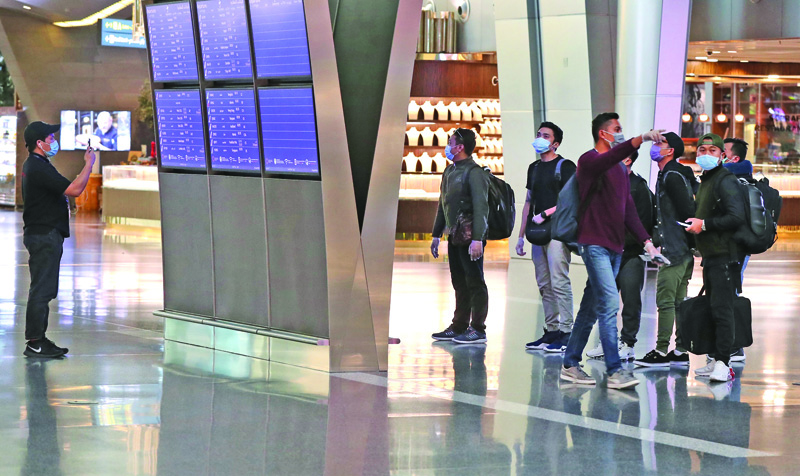
DUBAI: Air traffic in the Middle East and North Africa is set to plummet by more than half this year due to the coronavirus pandemic, a global aviation body said. "Airlines in the Middle East continue to be battered by the impact of COVID-19," said Muhammad Albakri of the International Air Transport Association. "Passenger traffic has all but ground to a halt and revenue streams have evaporated."
Albakri, the IATA's vice-president for Africa and the Middle East said traffic would fall by at least 51 percent compared to last year. MENA airlines' revenues slashed by $24.5 billion, he added. Almost all the MENA region's 19 state-owned airlines and a dozen private carriers have been grounded amid strict measures to combat the spread of the coronavirus, including halting air traffic. A few airlines have continued or resumed limited operations, including Qatar Airways, Emirates Airline and Etihad.
The International Civil Aviation Organization, a UN agency, said Wednesday that the pandemic could mean 1.2 billion fewer air passengers worldwide by September. The IATA, an industry association, said the Middle East's aviation shutdown threatens some 1.2 million jobs -- 300,000 more than a previous estimate three weeks ago and half the total jobs in the industry.
The estimates are based on a scenario that severe travel restrictions will last three months, before being gradually lifted for domestic flights, followed by regional and intercontinental services.
To minimize the damage to MENA economies, IATA urged governments to offer airlines direct financial support, loans and tax relief. The body said it is meeting virtually this week with governments and airlines to ensure that the sector is ready to resume operations when the pandemic is contained. "Starting up will be complicated. We need to make sure that the system is ready, have a clear vision of what is needed for a safe travel experience," Albakri said.
Middle Eastern and African governments are failing to take the action required to protect their airlines from the economic crisis caused by the new coronavirus pandemic, he said. Several states have stepped in to help their airlines that have seen travel demand decimated by the global outbreak, such as the United States, Singapore and Australia, though few in the Middle East have made their intentions clear. IATA, which represents 290 global airlines, has been consulting with African and Middle Eastern governments, regulators and stakeholders on how to revive air travel as some countries start to slowly ease lockdowns.
"We have not seen the desired movements and decisions of governments and decision makers to … put on the table the economic stimulation packages and the rescue packages, financial packages necessary to keep the airlines in the region alive," Albakri said on a call with reporters. IATA wants to see Middle Eastern governments "prioritize aviation and announce specific rescue measures for the airlines and aviation industry in line with other nations," he said.
The industry body also warned African airlines were on the verge of collapse unless governments urgently stepped in. "Air Mauritius has entered voluntary administration, South African Airways and SA Express are in business rescue, other distressed carriers have placed staff on unpaid leave or signalled their intention to cut jobs. More airlines will follow if urgent financial relief is not provided," Albakri said.
German airline giant Lufthansa said the group was in "intensive negotiations with the governments of its home countries… to sustainably secure the group's solvency", as it reported a 1.2-billion-euro operating loss in the first quarter. "The business outlook, existing multi-billion liabilities… and refunds of cancelled tickets as well as upcoming repayments of financial liabilities" will make state bailouts indispensable, the group said in a statement.
But bosses are "confident" that talks with national capitals-including in the home countries of subsidiaries Brussels and Austrian Airlines and Swiss-"will lead to a successful conclusion". Preliminary results showed Lufthansa's revenues fell 18 percent year-on-year in January-March, to 6.4 billion euros ($6.9 billion). In March alone, sales fell almost 50 percent, or 1.4 billion euros. On top of the 1.2-billion-euro plunge in adjusted operating profit before interest and taxes (EBIT), Lufthansa "expects crisis-related asset impairments and the negative development of the value of fuel hedges to have a further significant negative impact" on first-quarter profits, it added.
The group will publish full financial results in "the second half of May", postponing the release from April 30. And with its flight plan slashed to a bare minimum, Lufthansa "expects a considerably higher operating loss in the second quarter compared to the first quarter", eating still further into its 4.4-billion-euro cash buffer. Last week, Lufthansa said its emergency flight plan would remain in effect until at least May 17, while earlier in April chief executive Carsten Spohr said it would need state aid to survive. - Agencies










